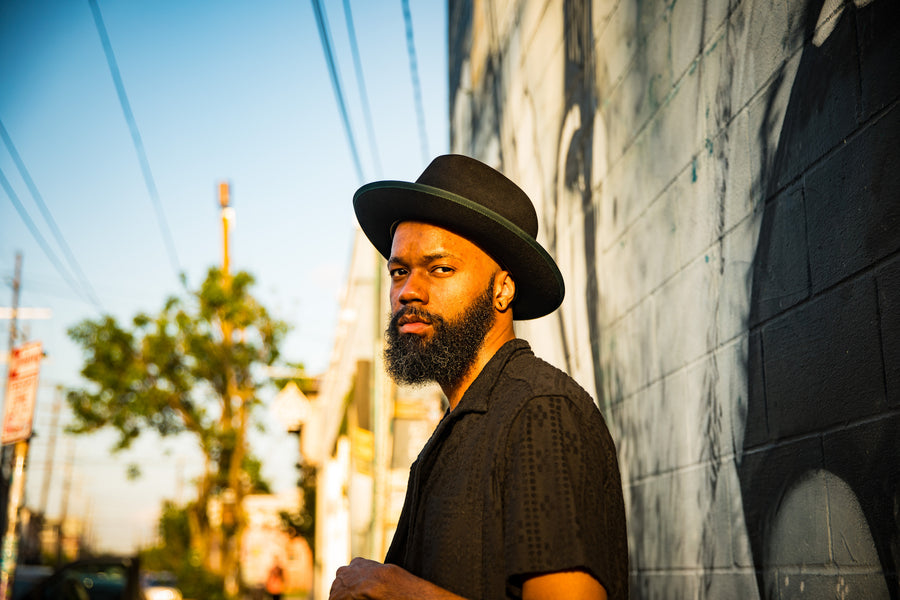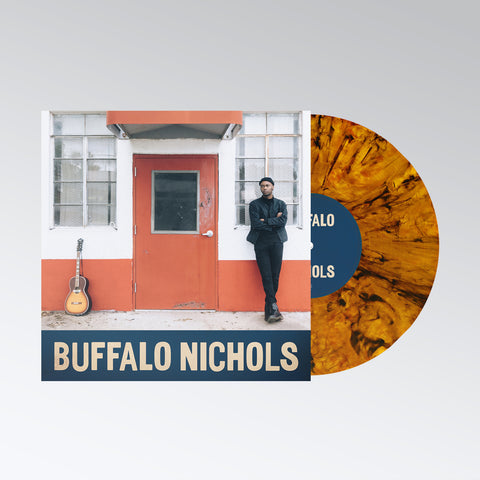Buffalo Nichols
Contact

Bio
On his second album, The Fatalist, Carl “Buffalo” Nichols does things with the blues that might catch you off guard. There’s 808 programming, chopped up Charley Patton samples, washes of synth. There’s a consideration of the fullness of the sonic stage and the atmospherics of the music that can only come with a long engagement with electronic music. But this is no gimmicky hybrid or attempt to turn the blues into 21st century music by simply dressing it with skittering hi-hats. Nichols’ vision for the blues is of a form of music that’s intimately tied to everyday life in 2023, something that’s reflected not only in the choice of instrumentation, but in the complexities of the songwriting and the gray areas his lyrics explore. This is music that comes straight from the present, and as such, it’s a reminder that the same shit that drove the first blues singers to pick up a guitar is still present behind the throbs of deep bass hits today. The Fatalist sounds unlike any blues record you’re likely to hear in 2023.
Of course, Nichols’ songwriting has always been firmly rooted in the present. He proved he could succeed on the music industry’s own blues terms on his self-titled 2021 debut, whose songs, Bandcamp Daily said, “seem to flow from some great repository of emotion and insight.” The Fatalist finds him digging deeper in search of answers to ever-more-complicated questions around responsibility and self-definition, his plainspoken lyrics both cutting and refreshing in their sincerity and refusal to accept pat solutions. Over a guitar line that blisters and pops with bright sunshine, he holds forth on the simple everyday power of love in “Love is All,” and when he shades his optimism with a clear-eyed view of “bad behavior in the canon of good men,” as he sings, his guitar line goes cloudy with the thought. He slowly walks around a broken relationship in “The Difference,” trying to find the faults. It’s a decidedly modern breakup song, one steeped in moral ambiguity. “I just don’t know the difference between love and sympathy,” he sings, before hoping his once-beloved “won’t forget the one who kept your ego fed.”
Still, Nichols rarely sounds like a blues singer. Like Leonard Cohen, he dominates these songs with his voice. His low, guttural baritone is high in the mix, and he sounds coiled, clenched tight. The slow drip of his songwriting lends The Fatalist an incredible amount of drama, which the production—at times dark and dewy and claustrophobic, at times zippy with light—further emphasizes.
Nichols produced the album himself at home, having recently returned to Milwaukee following a few years in Austin. “Being back in Milwaukee reminded me of why I started making music in the first place. It got me away from the ‘industry-town’ mentality,” he says. “There’s definitely a certain work ethic that comes from being in a city like Milwaukee. There are no clear paths to success and not many examples of ‘making it,’ so people end up creating their own path and developing a broad skill set to sustain a career as an artist.”
That personal touch is evident in how considerately these songs have been framed. “In a lot of ways I was improvising,” he says, and he leaned on his years of experience as a DIY musician—and the songs themselves—to guide him. “Drum machines are a 50-year-old technology. If the blues hadn’t been hijacked and trapped in amber, I think they naturally would’ve been incorporated.” The drum programming throughout feels like a natural rhythmic vehicle for these songs. “When you pick up a guitar, the first thing you’re gonna play is the blues,” he says. “And when you pick up an 808, you’re gonna start doing trap beats.”
The album’s most ambitious song is Nichols’ dusky take on Blind Willie Johnson’s “You’re Gonna Need Somebody On Your Bond.” As he sings of salvation and relief, Nichols creates a soundscape that teems with the joyous claustrophobia of classic gospel. Triggers of Charley Patton’s version connect the earliest blues recordings to the present, both singers’ voices urgent in their message. “It’s important for contemporary musicians to play these old songs sometimes,” Nichols says. “I always keep traditional songs in my set and on my records because I remember how important it was for me to hear somebody interpret a song in a way that made sense to me.”
Nichols further draws the past into the present in “The Fatalist Blues,” a song that simmers with unanswered questions and quotes the classic blues song “Samson and Delilah.” “That was a question that stayed on my mind,” Nichols says. “If you’re raised in a violent environment, are you destined to become that, or can you do something to change that?” The song finds Nichols testing the boundaries of will—“If I had my way I would fill my whole world with love,” he sings, and the implication is he’s not sure if he has his way or not. Even as that ambiguity gives the song a greater sense of dramatic tension, uncertainty also carries within it the glimmer of hope, and the imperative to try.
The stakes throughout this album are largely personal, rather than social; Nichols is singing about his life in the first person, and about his desire to forge his own individuality in a world and a music industry that make it nearly impossible to do so. Ringing through “The Fatalist Blues”—and The Fatalist—is a simple question: Do I have any say in how things are going to go? It’s the question behind so much of the physical and psychic pain in the blues, and in a frustrating age that preaches self-empowerment and shames the disenfranchised, it’s a stridently modern question, too. By playing his music the way he wants to play it, by refusing to give up his creative control or accept anyone else’s definition of the blues or indeed his own life, Carl Nichols has tried to forge an answer. Does he have any say in how things are going to go? Let’s find out.
Show More
Of course, Nichols’ songwriting has always been firmly rooted in the present. He proved he could succeed on the music industry’s own blues terms on his self-titled 2021 debut, whose songs, Bandcamp Daily said, “seem to flow from some great repository of emotion and insight.” The Fatalist finds him digging deeper in search of answers to ever-more-complicated questions around responsibility and self-definition, his plainspoken lyrics both cutting and refreshing in their sincerity and refusal to accept pat solutions. Over a guitar line that blisters and pops with bright sunshine, he holds forth on the simple everyday power of love in “Love is All,” and when he shades his optimism with a clear-eyed view of “bad behavior in the canon of good men,” as he sings, his guitar line goes cloudy with the thought. He slowly walks around a broken relationship in “The Difference,” trying to find the faults. It’s a decidedly modern breakup song, one steeped in moral ambiguity. “I just don’t know the difference between love and sympathy,” he sings, before hoping his once-beloved “won’t forget the one who kept your ego fed.”
Still, Nichols rarely sounds like a blues singer. Like Leonard Cohen, he dominates these songs with his voice. His low, guttural baritone is high in the mix, and he sounds coiled, clenched tight. The slow drip of his songwriting lends The Fatalist an incredible amount of drama, which the production—at times dark and dewy and claustrophobic, at times zippy with light—further emphasizes.
Nichols produced the album himself at home, having recently returned to Milwaukee following a few years in Austin. “Being back in Milwaukee reminded me of why I started making music in the first place. It got me away from the ‘industry-town’ mentality,” he says. “There’s definitely a certain work ethic that comes from being in a city like Milwaukee. There are no clear paths to success and not many examples of ‘making it,’ so people end up creating their own path and developing a broad skill set to sustain a career as an artist.”
That personal touch is evident in how considerately these songs have been framed. “In a lot of ways I was improvising,” he says, and he leaned on his years of experience as a DIY musician—and the songs themselves—to guide him. “Drum machines are a 50-year-old technology. If the blues hadn’t been hijacked and trapped in amber, I think they naturally would’ve been incorporated.” The drum programming throughout feels like a natural rhythmic vehicle for these songs. “When you pick up a guitar, the first thing you’re gonna play is the blues,” he says. “And when you pick up an 808, you’re gonna start doing trap beats.”
The album’s most ambitious song is Nichols’ dusky take on Blind Willie Johnson’s “You’re Gonna Need Somebody On Your Bond.” As he sings of salvation and relief, Nichols creates a soundscape that teems with the joyous claustrophobia of classic gospel. Triggers of Charley Patton’s version connect the earliest blues recordings to the present, both singers’ voices urgent in their message. “It’s important for contemporary musicians to play these old songs sometimes,” Nichols says. “I always keep traditional songs in my set and on my records because I remember how important it was for me to hear somebody interpret a song in a way that made sense to me.”
Nichols further draws the past into the present in “The Fatalist Blues,” a song that simmers with unanswered questions and quotes the classic blues song “Samson and Delilah.” “That was a question that stayed on my mind,” Nichols says. “If you’re raised in a violent environment, are you destined to become that, or can you do something to change that?” The song finds Nichols testing the boundaries of will—“If I had my way I would fill my whole world with love,” he sings, and the implication is he’s not sure if he has his way or not. Even as that ambiguity gives the song a greater sense of dramatic tension, uncertainty also carries within it the glimmer of hope, and the imperative to try.
The stakes throughout this album are largely personal, rather than social; Nichols is singing about his life in the first person, and about his desire to forge his own individuality in a world and a music industry that make it nearly impossible to do so. Ringing through “The Fatalist Blues”—and The Fatalist—is a simple question: Do I have any say in how things are going to go? It’s the question behind so much of the physical and psychic pain in the blues, and in a frustrating age that preaches self-empowerment and shames the disenfranchised, it’s a stridently modern question, too. By playing his music the way he wants to play it, by refusing to give up his creative control or accept anyone else’s definition of the blues or indeed his own life, Carl Nichols has tried to forge an answer. Does he have any say in how things are going to go? Let’s find out.
Tracks
Tour Dates
- Choosing a selection results in a full page refresh.
- Press the space key then arrow keys to make a selection.

